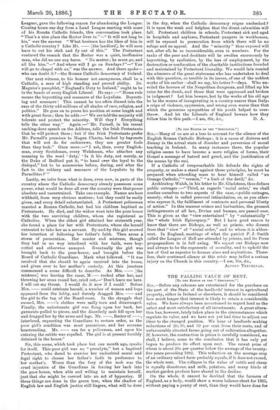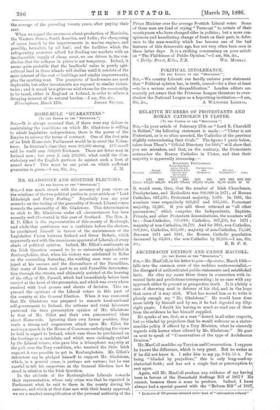THE FALLING VALUE OF RENT.
[To THE EDITOR OF THE " SPECTATOR."] SIR,—Before any schemes are entertained for the purchase on the part of the State of the landlords' interest in agricultural property, either in Ireland or elsewhere, it should be considered how much longer that interest is likely to retain a considerable value. We have always been accustomed to regard land as the safest and most satisfactory of all investments. A groat altera- tion has, however, lately taken place in the circumstances which regulate its value, and we have not yet had time to adjust our ideas to the changed position. We hear of landlords making reductions of 20, 30, and 50 per cent. from their rents, and of unfavourably situated farms going out of cultivation altogether. If, however, the contraction in prices is carefully considered, we shall, I believe, come to the conclusion that it has only yet begun to produce its effect upon rent. The recent price of wheat is about 20s. per quarter below the average of the twenty- five years preceding 1882. This reduction on the average crop of an ordinary mixed farm probably equals, if it does not exceed, the whole rent. The collapse in the value of cattle and sheep is equally disastrous, and milk, potatoes, and many kinds of market-garden produce have shared in the decline.
On the whole, it cannot be doubted that the farmers of England, as a body, would show a worse balance-sheet for 1885, without paying a penny of rent, than they would have done for the average of the preceding twenty years, after paying their rent.
When we regard the enormous wheat-production of Manitoba, the Western States, South America, and India ; the cheapening of ocean transit by the improvements in marine engines, and possibly, hereafter, by oil fuel ; and the facilities which the refrigerating processes afford for flooding our markets with an inexhaustible supply of cheap meat, we are driven to the con- clusion that the collapse in prices is not temporary. Indeed, it seems quite probable that the landlords' value in purely agri- cultural land in these islands will decline until it consists of the mere interest of the cost of buildings and similar improvements, plus the sporting rent. The prospects of landowners are most deplorable, but other investments are exposed to similar vicissi- tudes ; and it would be a grievous misfortune for the community to be taxed, either in England or Ireland, in order to relieve a decaying interest of its natural burden.—I am, Sir, &c.,



































 Previous page
Previous page